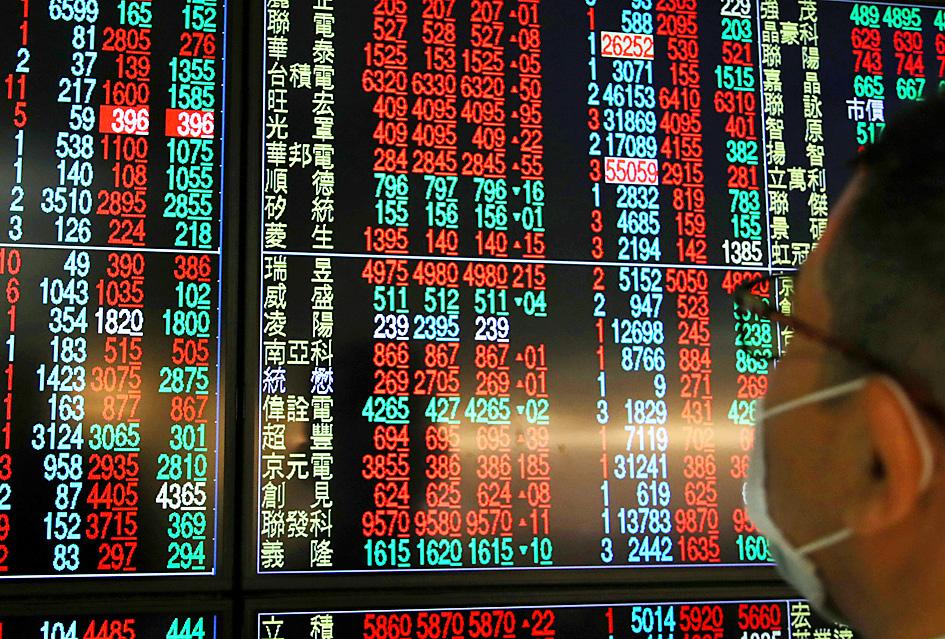Equity investors in Taiwan earned about NT$1 million (US$35,224) on average in the past lunar year, boosted by a 30 percent rise in share prices, Taiwan Stock Exchange data showed.
On Friday, the last trading session in the Year of the Rat, the benchmark index closed at 15,802.40, which is 3,683.69 points, or 30.4 percent, higher than in the last session in the previous lunar year, the Year of the Pig.
Market capitalization increased by NT$11.37 trillion, or 30.92 percent, from a year earlier to NT$48.16 trillion.

Photo: CNA
As of the end of last month, there were 11.28 million investors on the equity market, earning about NT$1.1 million on average in the 12-month period, the data showed.
Despite the COVID-19 pandemic, global financial markets remained resilient, as the US Federal Reserve and other major central banks pumped cash into economies, analysts said.
The spillover effects of loose monetary policies led to strong and sustained fund inflows into Taiwan, they said.
The TAIEX on Jan. 7 surpassed 15,000 points, peaked at 16,153.77 points on Jan. 21 and finished at 15,802.40 on Friday.
The gains were driven largely by contract chipmaker Taiwan Semiconductor Manufacturing Co (TSMC, 台積電), which soared almost 90 percent in the Year of the Rat.
TSMC remained the global leader in high-end technology development, weathering headwinds from the pandemic, analysts said.
TSMC reallocated capacity after it lost orders from one of its major customers, Huawei Technologies Co (華為), due to US sanctions on the Chinese firm, they said.
In the Year of the Rat, TSMC’s market cap rose by NT$7.75 trillion to NT$16.38 trillion, as its shares soared by NT$299.00. Its shareholders earned NT$309,000 for every 1,000 shares, in addition to a cash dividend of NT$10 per share.
TSMC’s gains contributed 2,546 points to the TAIEX’s increase in the past lunar year.
The chipmaker remained the most profitable company in Taiwan, posting a record net profit of NT$517.89 billion, or earnings per share of NT$19.97.
TSMC has forecast a 15 percent sales increase this year, while the average growth in the pure-play wafer foundry industry is projected to be 10 percent.
Among the other companies that contributed significantly to the TAIEX’s gains, integrated circuit designer MediaTek Inc (聯發科) posted NT$41.44 billion in net profit, an annual gain of 78.6 percent, driven by increased shipments of 5G chips.
In the Year of the Rat, MediaTek shares soared NT$531 from a year earlier to close at NT$950, with its market cap increasing by NT$844.29 billion. Its shareholders earned NT$541,500 for every 1,000 shares, in addition to a cash dividend of NT$10.5 per share.
Trading on the local equity market is to resume on Wednesday next week.

Taiwan will prioritize the development of silicon photonics by taking advantage of its strength in the semiconductor industry to build another shield to protect the local economy, National Development Council (NDC) Minister Paul Liu (劉鏡清) said yesterday. Speaking at a meeting of the legislature’s Economics Committee, Liu said Taiwan already has the artificial intelligence (AI) industry as a shield, after the semiconductor industry, to safeguard the country, and is looking at new unique fields to build more economic shields. While Taiwan will further strengthen its existing shields, over the longer term, the country is determined to focus on such potential segments as

UNCERTAINTY: Innolux activated a stringent supply chain management mechanism, as it did during the COVID-19 pandemic, to ensure optimal inventory levels for customers Flat-panel display makers AUO Corp (友達) and Innolux Corp (群創) yesterday said that about 12 to 20 percent of their display business is at risk of potential US tariffs and that they would relocate production or shipment destinations to mitigate the levies’ effects. US tariffs would have a direct impact of US$200 million on AUO’s revenue, company chairman Paul Peng (彭雙浪) told reporters on the sidelines of the Touch Taiwan trade show in Taipei yesterday. That would make up about 12 percent of the company’s overall revenue. To cope with the tariff uncertainty, AUO plans to allocate its production to manufacturing facilities in

COLLABORATION: Given Taiwan’s key position in global supply chains, the US firm is discussing strategies with local partners and clients to deal with global uncertainties Advanced Micro Devices Inc (AMD) yesterday said it is meeting with local ecosystem partners, including Taiwan Semiconductor Manufacturing Co (TSMC, 台積電), to discuss strategies, including long-term manufacturing, to navigate uncertainties such as US tariffs, as Taiwan occupies an important position in global supply chains. AMD chief executive officer Lisa Su (蘇姿丰) told reporters that Taiwan is an important part of the chip designer’s ecosystem and she is discussing with partners and customers in Taiwan to forge strong collaborations on different areas during this critical period. AMD has just become the first artificial-intelligence (AI) server chip customer of TSMC to utilize its advanced

While China’s leaders use their economic and political might to fight US President Donald Trump’s trade war “to the end,” its army of social media soldiers are embarking on a more humorous campaign online. Trump’s tariff blitz has seen Washington and Beijing impose eye-watering duties on imports from the other, fanning a standoff between the economic superpowers that has sparked global recession fears and sent markets into a tailspin. Trump says his policy is a response to years of being “ripped off” by other countries and aims to bring manufacturing to the US, forcing companies to employ US workers. However, China’s online warriors